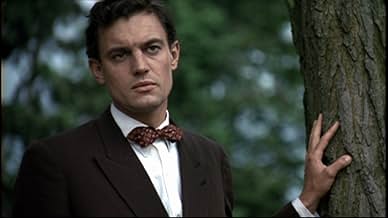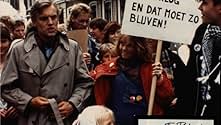NOTE IMDb
7,2/10
3,5 k
MA NOTE
Ajouter une intrigue dans votre langueA Dutch doctor, haunted by grueling childhood memories of World War II, struggles to find peace as he spends his life looking for answers about the tragic night that shaped him.A Dutch doctor, haunted by grueling childhood memories of World War II, struggles to find peace as he spends his life looking for answers about the tragic night that shaped him.A Dutch doctor, haunted by grueling childhood memories of World War II, struggles to find peace as he spends his life looking for answers about the tragic night that shaped him.
- Réalisation
- Scénario
- Casting principal
- Récompensé par 1 Oscar
- 5 victoires au total
John Kraaijkamp Sr.
- Cor Takes
- (as John Kraaykamp)
Akkemay Elderenbos
- Sandra
- (as Akkemay)
Avis à la une
The Dutch are not great at making movies but when they make a WW II movie it often is a little masterpiece. "De Aanslag" is a movie like this.
"De Aanslag" isn't necessarily about WW II but more about the effects of it on a persons life and why things happen the way they do and how little things can effect a persons life for ever. Most of the movie's story is set in the years after WW II and uses flashbacks of things that happened in WW II to make more things clear and to show things from a different perspective from different individuals that were involved in the incident were the movie is about. It becomes more and more clear what happened at the night that collaborator Ploeg was killed but the Dutch resistance and more importantly why things happened the way it happened. The story also shows a detailed view of the Netherlands and their citizens the years and decades after WW II and how it still affected many.
There are many great returning characters in the story and the acting is for especially Dutch standards pretty high. Derek de Lint who now is better know world wide for his role as Derek Rayne in "Poltergeist: The Legacy" is a great leading man that really carries the movie.
The cinematography from Theo van de Sande who later did the cinematography for the movie hit "Blade" is great and sets a nice mood. The directing by Fons Rademakers is done wonderfully and it never makes the movie hard to follow even though at times it gets a bit complicated.
Great Dutch Oscar winning drama with some memorable moments and a fantastic ending were everything comes together and gets clear.
8/10
http://bobafett1138.blogspot.com/
"De Aanslag" isn't necessarily about WW II but more about the effects of it on a persons life and why things happen the way they do and how little things can effect a persons life for ever. Most of the movie's story is set in the years after WW II and uses flashbacks of things that happened in WW II to make more things clear and to show things from a different perspective from different individuals that were involved in the incident were the movie is about. It becomes more and more clear what happened at the night that collaborator Ploeg was killed but the Dutch resistance and more importantly why things happened the way it happened. The story also shows a detailed view of the Netherlands and their citizens the years and decades after WW II and how it still affected many.
There are many great returning characters in the story and the acting is for especially Dutch standards pretty high. Derek de Lint who now is better know world wide for his role as Derek Rayne in "Poltergeist: The Legacy" is a great leading man that really carries the movie.
The cinematography from Theo van de Sande who later did the cinematography for the movie hit "Blade" is great and sets a nice mood. The directing by Fons Rademakers is done wonderfully and it never makes the movie hard to follow even though at times it gets a bit complicated.
Great Dutch Oscar winning drama with some memorable moments and a fantastic ending were everything comes together and gets clear.
8/10
http://bobafett1138.blogspot.com/
'De Aanslag' is an epic drama taking place in the final days of German occupation of the Netherlands in 1945.
A Nazi collaborator, Ploeg, was shot dead in Haarlem, and the corpse dragged to the front of a neighbouring house. When the Nazis arrived they assumed that the people in that house were responsible, arrested the occupants and set the house alight. Several other people were also rounded up and all executed. The exception is Anton, the 12 year old son of the family who lived in the house, who was taken to the military HQ and later sent to his uncle in Amsterdam.
These traumatic events had a serious psychological impact on Anton, particularly in his later life. Like a slow puzzle, the pieces began fitting together. As an adult Anton discovered who killed the collaborator, and who dragged the body to the front of their house, events that had such devastating effects.
It is an excellent film, but in my view a little too long. It loses momentum halfway through, but fortunately picks up again towards the end. Acting, cinematography and music score are top-notch. It brings a powerful anti-war message, and also explores the power of public mass protest to change the social order. I still score it a very good 8/10.
A Nazi collaborator, Ploeg, was shot dead in Haarlem, and the corpse dragged to the front of a neighbouring house. When the Nazis arrived they assumed that the people in that house were responsible, arrested the occupants and set the house alight. Several other people were also rounded up and all executed. The exception is Anton, the 12 year old son of the family who lived in the house, who was taken to the military HQ and later sent to his uncle in Amsterdam.
These traumatic events had a serious psychological impact on Anton, particularly in his later life. Like a slow puzzle, the pieces began fitting together. As an adult Anton discovered who killed the collaborator, and who dragged the body to the front of their house, events that had such devastating effects.
It is an excellent film, but in my view a little too long. It loses momentum halfway through, but fortunately picks up again towards the end. Acting, cinematography and music score are top-notch. It brings a powerful anti-war message, and also explores the power of public mass protest to change the social order. I still score it a very good 8/10.
This film is based on the Harry Mulisch novel, and both have some distinguishing characteristics that go back - on purpose - to classic Greek tragedy theatre. The incredible co-incidence that carries the story is reminiscent of ancient literary 'vehicles' that carry a story. Thus, you should not look at the chance events as being part of the story, but as being the foundation for the story - they, in themselves, should not really be questioned.
Also, note that every chance meeting is preceded by a meeting with some kind of stone. The Dutch word for dice is 'dobbelsteen', or dicing-stone, so that the simile of dice and chance can be extended to stones and chance. This explains the significance of Anton meeting his first wife while visiting the Stone of Scones.
The book, more strongly than the film, is also constructed as a Greek tragedy, with a prologue, five acts and then an epilogue.
Anton Steenwijk is also interesting himself: he represses the events of the assault, but it keeps coming back at him. But he is an anaesthetist in more than one way - he puts his memories to sleep. Even in the final stages, when the story is already quite clear to him, he uses drugs at his house in Tuscany and seeks to ease a toothache in Amsterdam before going to the Ban the Bomb demonstration.
Personally, I think the book was translated into a film in brilliant fashion. My major qualm with it is the mediocrity of the sound and sound effects. Some pretty good acting and a fantastic storyline make this one well worth the watch.
Also, note that every chance meeting is preceded by a meeting with some kind of stone. The Dutch word for dice is 'dobbelsteen', or dicing-stone, so that the simile of dice and chance can be extended to stones and chance. This explains the significance of Anton meeting his first wife while visiting the Stone of Scones.
The book, more strongly than the film, is also constructed as a Greek tragedy, with a prologue, five acts and then an epilogue.
Anton Steenwijk is also interesting himself: he represses the events of the assault, but it keeps coming back at him. But he is an anaesthetist in more than one way - he puts his memories to sleep. Even in the final stages, when the story is already quite clear to him, he uses drugs at his house in Tuscany and seeks to ease a toothache in Amsterdam before going to the Ban the Bomb demonstration.
Personally, I think the book was translated into a film in brilliant fashion. My major qualm with it is the mediocrity of the sound and sound effects. Some pretty good acting and a fantastic storyline make this one well worth the watch.
The film and the book, are really very much the same here. I read the book first and then watched the film and I have really not much to say about both. They are both of the same quality, for both book and film feature the same amount of accidental meetings which are after a while quite unbelievable and that is all the criticism I have. The film has of course certain things which are better than the book, for instance it is more exciting, but then again the film also has it's downsides, for sometimes the acting is not that great. But overall the better and worse things level each other out so my verdicts for book and film are the same: pretty good.
If you like Mulisch's books and are interested in World War 2 read De Zaak 40/61.
7 out of 10
If you like Mulisch's books and are interested in World War 2 read De Zaak 40/61.
7 out of 10
I saw this movie in school for an asignment and I was suprised by the fact that this was a Dutch movie. This is one of those movies wich can stand the test of time. A involving story is told about Anton Steenwijk who we will follow through out this film. A must see film that tells the story of a typical dutch family in war time.
Le saviez-vous
- GaffesToutes les informations contiennent des spoilers
- Citations
Anton Steenwijk: My parents were innocent.
Fake Ploeg: My father was too!
Anton Steenwijk: I only know what I was told.
Fake Ploeg: Exactly.
- ConnexionsFeatured in The 44th Annual Golden Globe Awards (1987)
Meilleurs choix
Connectez-vous pour évaluer et suivre la liste de favoris afin de recevoir des recommandations personnalisées
- How long is The Assault?Alimenté par Alexa
Détails
Box-office
- Montant brut aux États-Unis et au Canada
- 512 403 $US
- Montant brut mondial
- 512 403 $US
- Durée2 heures 21 minutes
- Mixage
- Rapport de forme
- 1.66 : 1
Contribuer à cette page
Suggérer une modification ou ajouter du contenu manquant
























